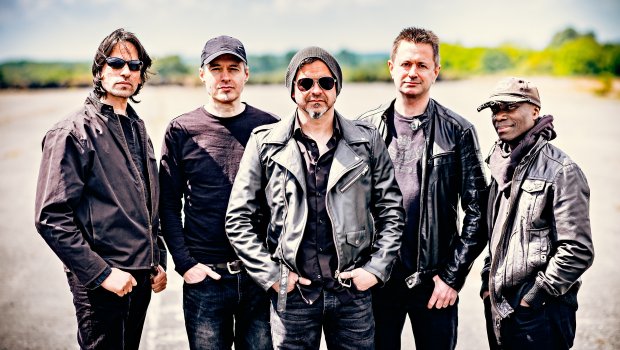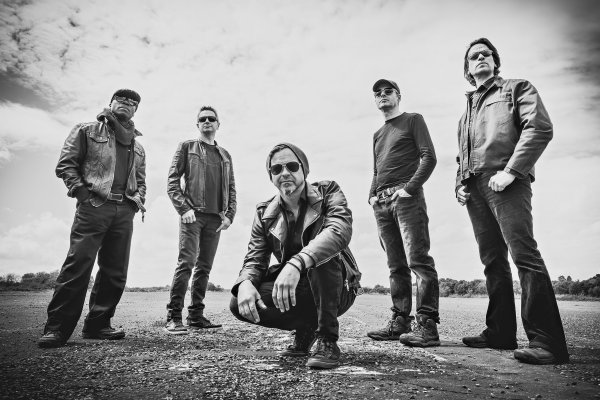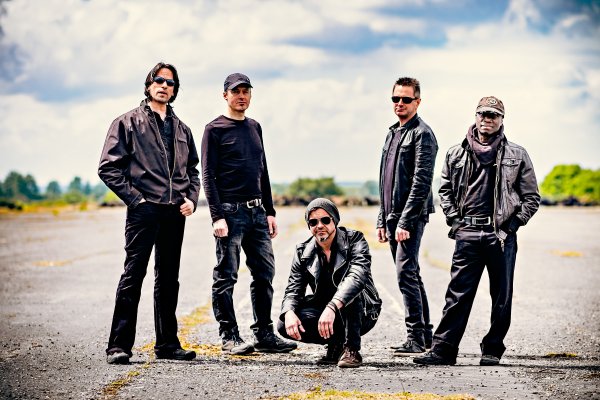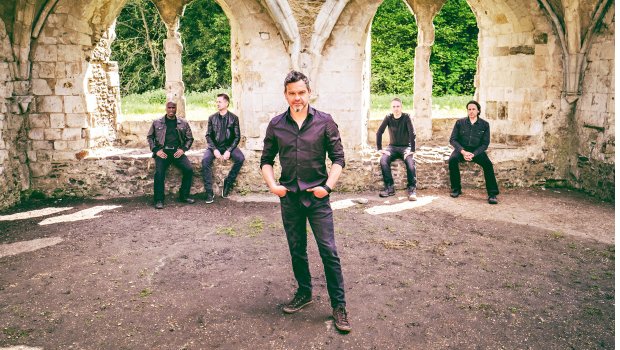With Threshold‘s eleventh album and first in three years, Legends of the Shires, appearing next month, TPA’s Rob Fisher took the opportunity to talk to keyboardist Richard West and returning singer Glynn Morgan about the new album, the band’s illustrious history and future developments.
You have a new album coming out: Legends of the Shires. It has so many resonances with your past history and reminded me of your earliest couple of albums along with Subsurface in particular. Yet the whole album feels fresh, dynamic, modern. Was this a deliberate thing you set out to do?
Richard West: To a degree, yes; this was a lot of the boxes we wanted to tick. We’ve always tried to stay modern in terms of keeping up with what’s going on, particularly the way melody shapes change and production ideas change over the years. Just like language, music moves on. You don’t want to get left behind speaking old English! So we’ve tried to stay with the times that way.
Karl and I thought back to Subsurface, loving the depth of those records and realising that on For The Journey we’d gone a little more straight ahead again, so we took the conscious decision to weave back in and go back to the sound of that album, whilst also going more progressive. It was definitely part of a conscious process.
It is interesting reading the press release for the album which has this bold opening statement: “It’s time for a new chapter”. That’s quite a definitive statement of intent about the directions in which you see yourselves going.
RW: Yeah. I don’t know who actually said that! We both [Richard and Glynn] got interviewed for that. It was in the context of we’d just finished ten years with the previous line-up and we’ve got some great memories of that, but it is time for a new chapter. That’s the context. You know, with Threshold we’ve never trodden an easy path. We’ve shot ourselves in the foot so much it’s hard to walk! But each time we pick ourselves up, we reinvent ourselves to a degree and I think we come back stronger. It was very much a feeling with this album – we’re down but we’re not out, we’ll climb back up again and this may be the best thing we’ve ever made. I kind of feel it is. Not to denigrate anything we’ve done in the past, but this is definitely our most complete sounding record.
I agree completely. What strikes me most are the layers of complexity and, when you hear it for the first time, layer upon layer of fantastic melodies. Combined with that is a greater sense that you all just ‘cut loose’, almost as if there’s this big sigh of relief and you just ‘go for it’. This seems to lead to a lot more instrumental virtuosity than I’ve noticed on any of the previous albums.
RW: I don’t know what happened but when we decided to do a more progressive album it was like the floodgates opened and somehow it all just flowed. I couldn’t tell you what it was beyond that. It was the easiest record to write. Everything just flowed.
So in terms of when you started writing this album in relation to where the line-up changes started to take place, was the idea of the album already under way by then?
RW: Yeah, we’re a funny old band. We make the demo sound like the finished album – not finished in terms of production quality but finished in the sense that everything is together. So that was already made last summer. It’s a long process; I’ll sing a whole set of demos first. Then I’ll get my wife to sing it which is usually much better! And then we’ll unleash it on the singer. It’s a well written album, but we’ve made a few changes where we had some additional ideas, made some new tweaks.
Glynn Morgan: Yes, I had some ideas when I first heard it, but not a lot of changes were required. I mean, for me, I got sent the demos and I said to Richard straight away that of all the Threshold albums I’d have wanted to sing on, this is the album – and I was lucky enough to get the chance. When I was listening, I was thinking it took me back to some of the earlier stuff – to me, because I’ve always been fan. The keyboard breaks – a lot more keys – yet it certainly hasn’t lost the guitar, the melodies (which Richard writes) and the harmonies – it all comes to together. I’m proud to have been on this album.
In terms of it all coming together, another thing that struck me quite forcibly is the album cover. Was that deliberately commissioned to a specific brief?
RW: It was hunted down exhaustively! We did actually commission an artist to do something based on his portfolio. He’d done this great piece of work and we wanted it but he sold it to another band just before we got to him. So we were forced to do something else. We were trawling and trawling trying to find something that says what we wanted to say. For me, I look back to Hypothetical as one of our gold standards for a cover. I remember our fans used to say they bought the record just based on the cover. It’s something that tells you it’s progressive but it’s dark. If a record can tell you what’s on it based on the cover, for me that’s something special. So I wanted something that had that ‘proggy’ thing, the Roger Dean kind of feel, but something more modern. When we saw this we thought: oh my goodness, that’s it! Plus it’s green, so it’s got the Shires feel; everything ticks the boxes. When you look at that cover, you kind of know what’s on it. Cover artwork can be a bit misleading in this century, but this kind of tells you it’s going to be prog. It may not say ‘heavy’ but it certainly says prog.
What was the intent when you started writing this album. Did you set out to write a double album?
RW: Not straight away. I think when we started rehearsing we realised just how much material we had. Karl had written the music for Lost in Translation which is ten minutes, I had done The Man Who Saw Through Time which was another twelve minutes – and before you know it you think: this is going to be a long record. So it was moderately early on. Then we looked at vinyl and the way it has become the poor cousin of the CD in that it never seems to be properly mapped out – so you might get 12 minutes on one side, 20 on another – so we did think early on, let’s make sure it works on vinyl too. So we mapped it out and made sure it works as four independent pieces. That was the idea which came together fairly early on.
So would this be fair to call Legends… a concept album?
RW: Oh totally. There is a definite story all the way through.
There is a quote from you which says this album is about finding your place in the world. Did you have a narrative in mind, a story you wanted to tell?
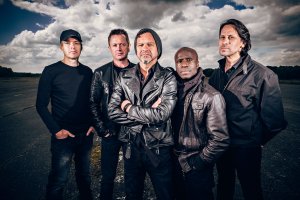 RW: To be honest, when I started writing I thought it was going to be ‘stories from the shires’. In Threshold we’ve never really done the story telling thing. I started to do it on songs like The Box on For the Journey and I loved it. It is so fulfilling as a writer. For Legends… it soon became apparent it was going to be stories about how the Shires came together, how they learned to interact with each other, and partly how England itself learned to interact with Europe. It’s got a very strong political side: the ballad on the album is basically a kind of divorce song between England and the European Union, it’s David Cameron saying goodbye to Angela Merkel. So it’s got that flavour running underneath; that’s the underlying theme, but written from the standpoint of a single person.
RW: To be honest, when I started writing I thought it was going to be ‘stories from the shires’. In Threshold we’ve never really done the story telling thing. I started to do it on songs like The Box on For the Journey and I loved it. It is so fulfilling as a writer. For Legends… it soon became apparent it was going to be stories about how the Shires came together, how they learned to interact with each other, and partly how England itself learned to interact with Europe. It’s got a very strong political side: the ballad on the album is basically a kind of divorce song between England and the European Union, it’s David Cameron saying goodbye to Angela Merkel. So it’s got that flavour running underneath; that’s the underlying theme, but written from the standpoint of a single person.
Something which shines through this and is emphasised in a lot of the talk surrounding the album is the language of being ‘progressive’; you say the band are trying to be ‘more ambitious’, ‘more progressive’. Can you say a little more about what you mean by being more progressive?
RW: You look at heavy metal from the ’80s and compare it with heavy metal now: it’s so much heavier now. Being progressive has changed its meaning over the years as well. It kind of means trying to progress the boundaries of what you can do with music, the influences you can incorporate. Now it’s partly that and partly being part of that genre which includes all those songs. It’s a double meaning.
Absolutely. At the moment I’m aware of various discussions over Steven Wilson’s new album – is it prog? Is it pop? – and you get all these intricate debates taking place on social media. There are parallels here with ‘progressive metal’; is it prog or is it metal? – where are the boundaries now? Are they still as sharply defined? Where do you see this album on the present musical map?
RW: I think when we decided this would be more progressive than our past albums it meant that we had more room to stretch out in the same way that they did in the old days – being able to stretch out beyond the five minute song, or have room to do a three minute solo here or stretch the boundaries and incorporate other stuff, so that’s kind of what we meant by it. But it is also still referencing what we grew up with. When you learn to speak, you learn a language, learn an accent and you don’t really lose that. It’s the same with music. As a kid growing up in the late ’70s you’re listening to pop music and then you suddenly discover Queen and Genesis, Floyd and you take that on as part of your language and it never leaves you.
Do you think the sound of the band has actually evolved? The albums feels a lot ‘cleaner’, a lot more focused with a little less distortion but a lot more clarity, particularly in the mix and the production itself. It’s a lot easier to hear the band.
RW: Compared to which one?
The last couple of releases. It sounds more focused and because of that, more muscular. There is a sharper sound and a more intense delivery.
RW: We certainly worked hard to get the sound that we got. We changed a lot of elements. You can have a different guitar tone which completely reshapes a Threshold record because it’s so prominent. For Legends… little things like the snare – we changed from a quite high pitched snare to a deeper snare and that brings the whole overall tone of the record down. The same happened with the singing. Damian has a higher range kind of frequency to his voice; Glynn has that smokier, kind of deeper sound, so it changes the overall sound of the record.
Along with the multi-part harmonies which really shine through; it’s fabulous to hear it.
My final question; are there plans to play this live in its entirety?
RW: My hope is that we do what we did with the last record. We toured and played a few songs from it and the following year we went and did the whole album. So that’s my personal hope, though I can’t make any promises. This would be an amazing record to do that with.
I hope so too. Richard, Glynn, thank you very much indeed.
[You can read Rob Fisher’s review of Legends of the Shires HERE.]

